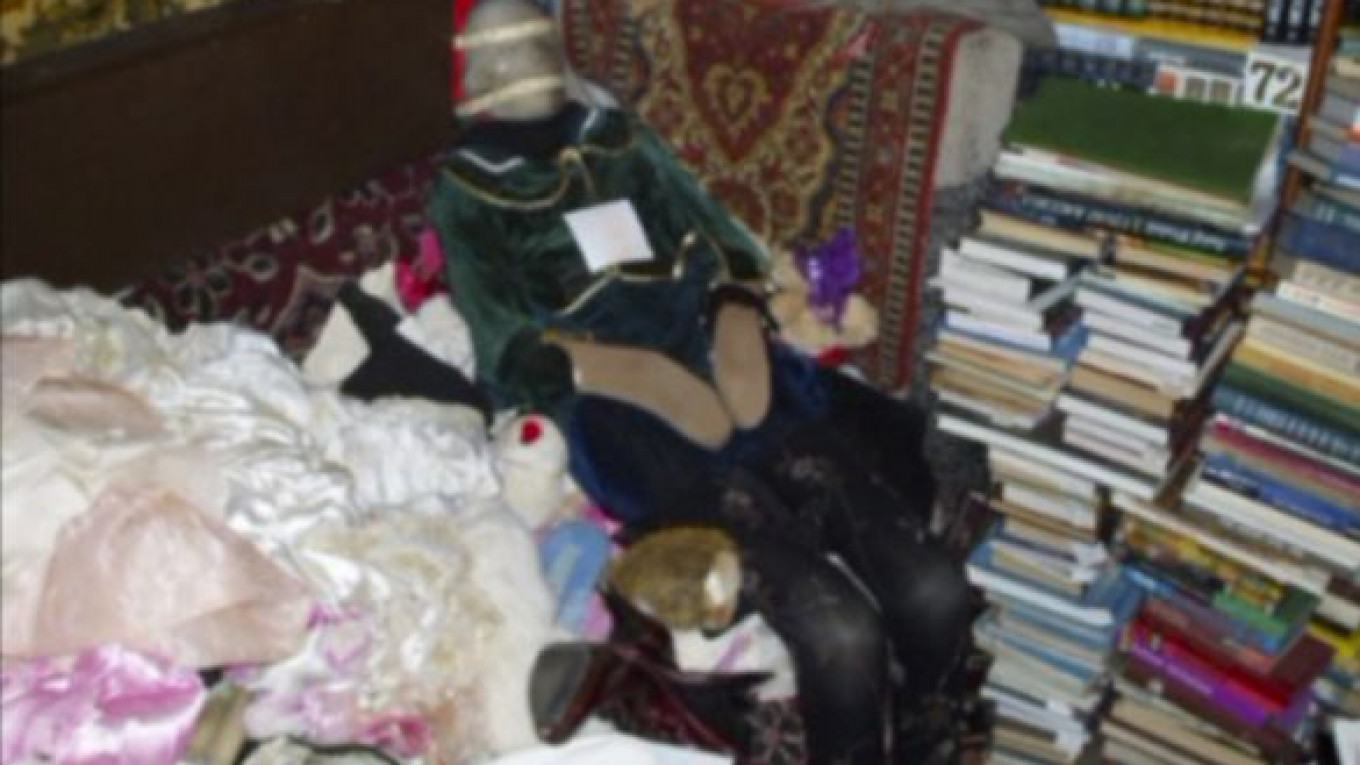The Nizhny Novgorod historian had always been open about his interest in the dead and eagerly described how he loved to rummage through cemeteries, studying grave stones to uncover the life stories behind them.
What he failed to mention, according to police, was that he had dug up 29 bodies and taken them back to his apartment, where he dressed them in women's clothes scavenged from graves and then put them on display.
A police video of the man's apartment in Nizhny Novgorod released Monday shows his macabre collection of what look like dolls. Life-size, they are dressed in bright dresses and headscarves, their hands and faces wrapped in what appears to be cloth. Police said they were mummified remains.
Instructions for doll-making were found in the apartment, police said, and the video showed old-fashioned plastic dolls in frilly dresses lying about.
Police refused to name the suspect arrested last week, but released photographs of him, gave his age as 45 and described him as a well-known specialist in the history of the city about 400 kilometers east of Moscow.
Russian media reports identified the man as Anatoly Moskvin, a 45-year-old historian who was considered the ultimate expert on cemeteries in Nizhny Novgorod.
Newspaper reports quoted police as saying that the man had only selected the remains of young women for his grisly collection.
Police said he had photographs and nameplates from gravesites, which could help with the identification of the remains.
The arrest followed a long-running investigation into the desecration of graves at several cemeteries in Nizhny Novgorod beginning in 2010, police spokeswoman Svetlana Kovylina said. She did not explain how they tracked him down.
Moskovsky Komsomolets said Moskvin was detained at a cemetery while carrying a bag of bones. But Kriminalnaya Khronika, an online publication specializing in crime news from the Nizhny Novgorod region, said police investigators discovered the bodies when they visited Moskvin to consult with him about the desecration.
Alexei Yesin, the editor of a local newspaper to which Moskvin contributed, said he was shocked by the reports and couldn't understand how he could have squeezed all the bodies into his apartment, which he shared with his parents.
He described Moskvin as a loner who had "certain quirks," but said he gave no indication that he was up to anything so strange. "I saw no signs of that while working with him," Yesin said in a telephone interview.
Moskvin, who long had been known in the region for his interest in the dead, wrote several articles about cemeteries and historic sites in the region. A linguistic expert by training, he specialized in Celtic culture and studied 13 foreign languages.
In a 2007 interview with the newspaper Nizhegorodsky Rabochy, Moskvin said he had begun wandering through cemeteries when he was in the seventh grade. "I don't think anyone in the city knows them better than I do," he said.
Moskvin claimed that from 2005 to 2007 he had inspected 752 cemeteries across the region, often traveling about 30 kilometers a day by foot.
He said he drank from puddles, spent nights in haystacks or at abandoned farms and once even slept in a coffin readied for a funeral. He said he was repeatedly questioned by police, who then always let him go.
Just last month, he wrote a piece for a publication on necrology to explain his interest in the dead. He said that when he was 12, he came across a funeral procession whose participants forced him to kiss the face of a dead 11-year-old girl.
"An adult pushed my face down to the waxy forehead of the girl in an embroidered cap, and there was nothing I could do but kiss her as ordered," Moskvin wrote in Nekrolog.
He said he later grew interested in the occult.
A Message from The Moscow Times:
Dear readers,
We are facing unprecedented challenges. Russia's Prosecutor General's Office has designated The Moscow Times as an "undesirable" organization, criminalizing our work and putting our staff at risk of prosecution. This follows our earlier unjust labeling as a "foreign agent."
These actions are direct attempts to silence independent journalism in Russia. The authorities claim our work "discredits the decisions of the Russian leadership." We see things differently: we strive to provide accurate, unbiased reporting on Russia.
We, the journalists of The Moscow Times, refuse to be silenced. But to continue our work, we need your help.
Your support, no matter how small, makes a world of difference. If you can, please support us monthly starting from just $2. It's quick to set up, and every contribution makes a significant impact.
By supporting The Moscow Times, you're defending open, independent journalism in the face of repression. Thank you for standing with us.
Remind me later.






